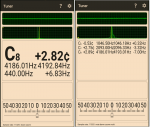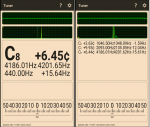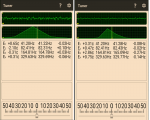Recently I was playing around with adding some filters to a tuner app on Linux: https://accordionists.co.uk/viewtopic.php?f=3&t=5525
In short, the goal was to enable the tuner to distinguish octave notes and to remove unwanted notes from the display if you know exactly what you are looking for.
Im posting a new thread because I dont want the technical details of that earlier thread to pollute the discussion.
The original developer, Bill Farmer, has now ported those filters over to the Android version of the tuner app (All credit goes to him - I didnt touch the Android code). It has not yet been released officially, but he has created an experimental release for us to test. Download and install Tuner-filters.apk from here: https://github.com/billthefarmer/tuner/releases/tag/v1.20
(You might have to set your phone to allow installation from Unknown sources.)
Once this is released officially it will be available on the F-Droid app store here:
https://f-droid.org/en/packages/org.billthefarmer.tuner/
You can read more about the app here:
https://github.com/billthefarmer/tuner/wiki
What changed?
The main additions are under Settings (cog icon) -> Note filter. Thatll give you two kinds of filters:
How to test?
When testing bass notes/octaves, enable Multiple notes, Audio filter and Downsample. See what you get - there should be a lot of spurious notes. Then enable the Fundamental note filter. This should narrow down the displayed notes to the correct note name (e.g. C only). If you get extra octaves below and above the expected octaves, use additional Octave filters to set only the correct ones.
When testing treble octaves, it might not be necessary to enable Audio filter, but you will probably need to enable Downsample. But do play around with the settings to see what ends up showing you the correct octaves.
The goal is to see whether the implemented DSP algorithms along with the filters will show values that correspond to those that you know are correct on your accordion. E.g. if you tuned it yourself by some other system, or had it perfectly tuned recently.
How else can you help?
If you speak Spanish, Portuguese, Hungarian or Japanese, have a look at the translations and if anything looks funny, post it here or if you are technical, do a pull request on GitHub.
If youre experienced in DSP, you can also have a look at the downsampling algorithm to see if it performing optimally. This is important for bass detection and for figuring out multiple octaves.
Suggestions?
If you have any other suggestions - for features or usability - open an issue on GitHub or post it here.
Why bother?
This app is free, both in price and in being open source. If these changes work as expected, then this will be a really useful app for accordion tuning since most other tuner apps typically only do a single note. Itll give you some of the multi note detection features that you might only find in tools like Dirks Tuner, but without all the other bells and whistles that you dont need, and without the hefty price tag.
In short, the goal was to enable the tuner to distinguish octave notes and to remove unwanted notes from the display if you know exactly what you are looking for.
Im posting a new thread because I dont want the technical details of that earlier thread to pollute the discussion.
The original developer, Bill Farmer, has now ported those filters over to the Android version of the tuner app (All credit goes to him - I didnt touch the Android code). It has not yet been released officially, but he has created an experimental release for us to test. Download and install Tuner-filters.apk from here: https://github.com/billthefarmer/tuner/releases/tag/v1.20
(You might have to set your phone to allow installation from Unknown sources.)
Once this is released officially it will be available on the F-Droid app store here:
https://f-droid.org/en/packages/org.billthefarmer.tuner/
You can read more about the app here:
https://github.com/billthefarmer/tuner/wiki
What changed?
The main additions are under Settings (cog icon) -> Note filter. Thatll give you two kinds of filters:
- Fundamental: When using the existing Multiple notes along with the Audio filter and Downsample settings, this filter will try to remove all the spurious notes and show you only the most likely one. You might still end up with spurious octaves below and above the notes you are interested in, which is where the next filter comes in.
- Note filters: When you enable this, you can select the specific notes and the octaves you are interested in seeing.
- Removing spurious octaves (with or without the Fundamental filter)
- Hiding some notes when playing chords
- Ignoring wrong notes/harmonics/overtones when playing a single note
How to test?
When testing bass notes/octaves, enable Multiple notes, Audio filter and Downsample. See what you get - there should be a lot of spurious notes. Then enable the Fundamental note filter. This should narrow down the displayed notes to the correct note name (e.g. C only). If you get extra octaves below and above the expected octaves, use additional Octave filters to set only the correct ones.
When testing treble octaves, it might not be necessary to enable Audio filter, but you will probably need to enable Downsample. But do play around with the settings to see what ends up showing you the correct octaves.
The goal is to see whether the implemented DSP algorithms along with the filters will show values that correspond to those that you know are correct on your accordion. E.g. if you tuned it yourself by some other system, or had it perfectly tuned recently.
How else can you help?
If you speak Spanish, Portuguese, Hungarian or Japanese, have a look at the translations and if anything looks funny, post it here or if you are technical, do a pull request on GitHub.
If youre experienced in DSP, you can also have a look at the downsampling algorithm to see if it performing optimally. This is important for bass detection and for figuring out multiple octaves.
Suggestions?
If you have any other suggestions - for features or usability - open an issue on GitHub or post it here.
Why bother?
This app is free, both in price and in being open source. If these changes work as expected, then this will be a really useful app for accordion tuning since most other tuner apps typically only do a single note. Itll give you some of the multi note detection features that you might only find in tools like Dirks Tuner, but without all the other bells and whistles that you dont need, and without the hefty price tag.



